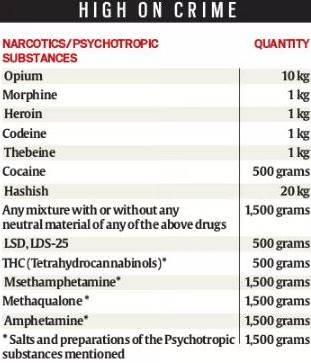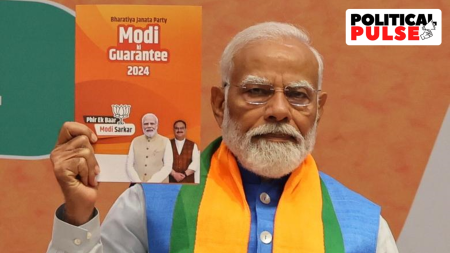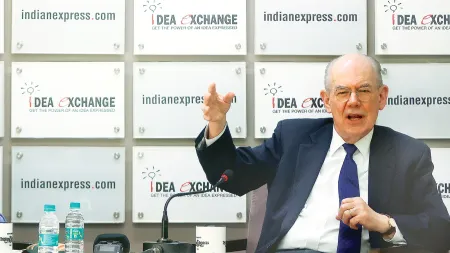- India
- International
Death penalty for drug crimes: How the law changed over time
A 2012 report by Harm Reduction International, formerly known as International Harm Reduction Association, a NGO working globally on the subject of drug trafficking mentioned India as one of 33 countries that retains death penalty for drug related offences.
 Section 31A, NDPS Act, 1985 already has a provision of death penalty for subsequent conviction under law. (Representational Image)
Section 31A, NDPS Act, 1985 already has a provision of death penalty for subsequent conviction under law. (Representational Image)
Section 31A, NDPS Act, 1985 already has a provision of death penalty for subsequent conviction under law. First incorporated in the statute in 1989, the Section 31A was amended in 2001 introducing the death penalty for subsequent conviction. However, 13 years later, another amendment in 2014 made it optional for the judge to award the death sentence.
Since 1985, when the Act first came up till date, several amendments were incorporated introducing most stringent penal framework for activities relating to narcotic drugs and psychotropic substances, fines and classifying the quality and quantity of the drugs seized. The Indian Express explains how and when Section 31A was incorporated to the Act and what all it contains. A 2012 report by Harm Reduction International, formerly known as International Harm Reduction Association, a NGO working globally on the subject of drug trafficking mentioned India as one of 33 countries that retains death penalty for drug related offences.
What does Section 31A, NDPS Act reads after amendment in 2001?
31-A. Death penalty for certain offences after previous conviction —
(1) Notwithstanding anything contained in Section 31, if any person who has been convicted of the commission of, or attempt to commit, or abetment of, or criminal conspiracy to commit, any of the offences punishable under (Section 19, Section 24, Section 27-A and for offences involving commercial quantity of any narcotic drug or psychotropic substance), is subsequently convicted of the commission of, or attempt to commit, or abetment of, or criminal conspiracy to commit, an offence relating to:
(a) engaging in the production, manufacture, possession, transportation, import into India, export from India or transhipment, of the narcotic drugs or psychotropic substances specified under column (1) of the Table below and involving the quantity which is equal to or more than the quantity indicated against each such drug or substance, as specified in column (2) of the said Table (see box)

(b) financing, directly or indirectly, any of the activities specified in clause (a) shall be punishable with death.
(2) Where any person is convicted by a competent Court of criminal jurisdiction outside India under any law corresponding to the provisions of [Section 19, Section 24 or Section 27-A and for offences involving commercial quantity of any narcotic drug or psychotropic substance] such person, in respect of such conviction, shall be dealt with for the purposes of sub-section (1) as if he had been convicted by a Court in India.

Another vital amendment to Section 31A in 2014
It was in 2011, when Mumbai High Court’s division bench comprising Justice A M Khanwilkar and Justice A P Bhangale declared Section 31A of NDPS Act that imposed mandatory death sentence for a subsequent conviction for drug trafficking “unconstitutional”. The High Court, made these observations while pronouncing the order in the case of a Kashmiri man Ghulam Mohammed Malik, who was sentenced to death by the Special NDPS Court in Mumbai in February 2008 for a repeat offence of smuggling charas (cannabis resin).
Read: Punjab wants death for drug traffickers
Besides various other amendments in other sections of the Act, another vital amendment was made to Section 31A.
It read – “In section 31A of the principal Act, in sub-section (1), for the words ‘shall be punishable with death’, the words and figures ‘shall be punished with punishment which shall not be less than the punishment specified in section 31 or with death’ shall be substituted.” After this amendment, it is not currently known if any death sentence was awarded in the country under the provisions of NDPS Act.
What amendments were made to the Act and when?
1989: NDPS Act underwent first set of amendments. A Cabinet Sub-Committee for combating drug trafficking and abuse recommended that the law be made more stringent. That was the time that among other provisions, Section 31A was incorporated to the statute.
1998: Second amendment to the NDPS Act was introduced in Parliament.
1998: The NDPS (Amendment) Bill, 1998 was examined by a Parliamentary Standing Committee on Finance.
Since the Act initially introduced a mandatory minimum penalty of rigorous imprisonment for 10 years and a fine of Rs one lakh, even for a small quantity of contraband, if the person possessing it fails to prove that the drug was meant for personal consumption. For repeat offences, the minimum sentence was 15 years imprisonment, that could extend to 30 years.
2001: Parliament passed the NDPS (Amendment) Act. The NDPS Act, 2001 sought to rationalise the sentencing structure that was considered harsh and disproportionate. It was this amendment that prescribed punishment according to the drug and quantity seized and classified the quantity of drug seized into “small” or “commercial”.
2014: Section 31 and 31A were also amended with certain modifications, including making “death sentence” optional.
Apr 17: Latest News
- 01
- 02
- 03
- 04
- 05








































